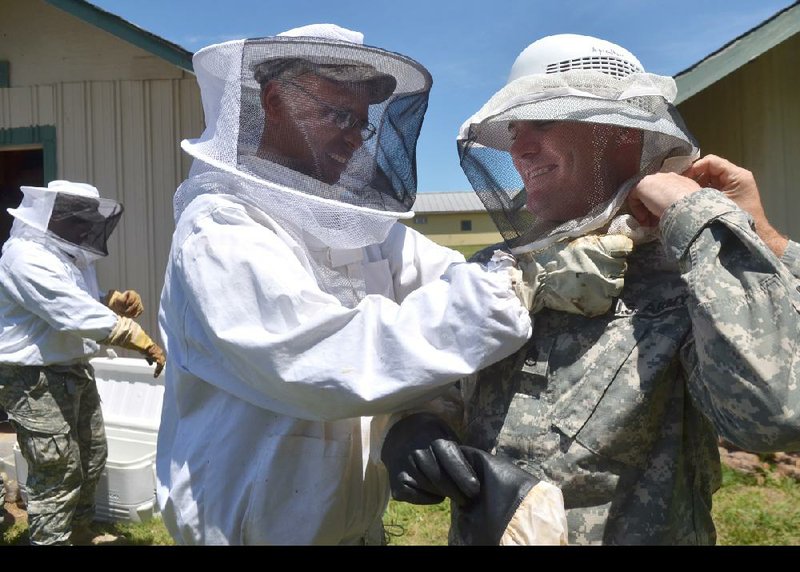FAYETTEVILLE — Col. Richard Sele met the dubas bug seven years ago.
He never forgot it.
Sele, who now commands the U.S. Army Reserves 431st Civil Affairs Battalion out of North Little Rock, was serving in northern Iraq in 2005 when he discovered that thousands of date farmers were battling a crippling infestation by the insect.
The dubas is a pest that attacks date palms in the Middle East, sucking their sap and leaving honeydew.
Their crops hadn’t beensprayed in two years, Sele said.
“If the Iraqi government failed to spray for one more year, their crops would be destroyed,” he said.
The government, supported by U.S. forces and other international organizations, sprayed the fields. If they hadn’t, those date farmers may have become insurgents, Sele said.
“When I took command of the [Arkansas] battalion,” Sele said, “I was reminded of that experience.”
That’s why Sele led 45 reservists to Northwest Arkan-sas this week to learn basic agricultural principles from faculty of the University of Arkansas’ Dale Bumpers College of Agricultural Food and Life Sciences and the UA Division of Agriculture.
The soldiers are being trained in areas ranging from animal diseases to vegetable and fruit production to water conservation and irrigation. They even spent a couple of hours Tuesday learning about bees.
The battalion is not under an alert order for deployment, Sele said. But there’s a chance that part or all of the battalion could be sent to Afghanistan or other countries under U.S. Central Command in the Middle East, North Africa or Central Asia, he said.
The battalion is under the U.S. Army Civil Affairs and Psychological Operations Command, based in Fort Bragg, N.C.
Since 2001, more than 20,000 Civil Affairs and Psychological Operations soldiers have deployed to more than 20 countries, according to the command’s public affairs office.
They have worked alongside combat units in the Iraq and Afghanistan wars, specializing in public administration skills such as welfare and health, public transportation, cultural affairs and food and agricultural services, according to the command.
The Arkansas soldiers can pass along to civilian populations the agricultural practices and techniques they are learning this week, Sele said.
“The agricultural sector is an important part of life in [the command’s] area,” he said. “I see this as very valuable training.”
Lt. Col. Jeff Wakelyn spent several summers visiting relatives on a dairy farm in Florida, yet he said he’s learning about subjects that didn’t know anything about.
An engineer by training, Wakelyn has been deployed to Afghanistan before, where he often interacted with farmers.
“I wish I had this training before I went to Afghanistan,” said Wakelyn, standing off to the side while soldiers huddled around beehives at the Arkansas Agricultural Research and Extension Center, better known as the UA farm, about 2 miles north of the Fayetteville campus.
“It would have been much easier to build that initial relationship with those farmers,” he said. “These are tools that soldiers can take anywhere in the world.”
Tuesday morning, the group gathered for sessions on plant diseases and soil fertility in the Pauline Whitaker Animal Science Center on the UA farm.
They took notes while Nathan Slaton, a UA professor of soil fertility, talked about identifying soil textures and moistures, among other things.
“If you’re dealing with plants and soil fertility, you’re going to be challenged,” Slaton said. “You’re going to be in a place that has completelydifferent soils and completely different crops than what we have here.”
The Agriculture Division has trained soldiers before, said Dustan Clark, interim associate director of the Center of Excellence for Poultry Science at UA.
The Arkansas National Guard requested training for its Agribusiness Development Team in preparation for two farming missions to Afghanistan, Clark said.
Like the reservists this week, those teams underwent intense training in agricultural practices, he said. The goal is to help reconstruct Afghanistan’s long-suffering agriculture industry after years of war and drought, he said.
“It’s time to help the people of Afghanistan rebuild,” Clark said.
The division “can in essence serve our country. We may not be going there ... a part of us will be there because we helped train them.” To contact this reporter:
Northwest Arkansas, Pages 7 on 06/13/2012

